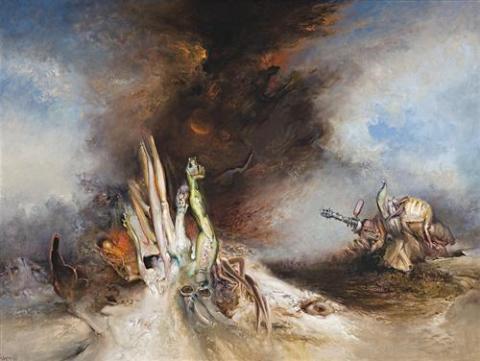FIRE!, 1995
James Gleeson
oil on canvas
133.0 x 178.0 cm
signed and dated lower left: Gleeson '95
inscribed verso: "FIRE!" / James Gleeson
Watters Gallery, Sydney
Charles Nodrum Gallery, Melbourne (label attached verso)
The Estate of Pro Hart, Broken Hill, New South Wales
'James Gleeson's late paintings will no doubt be interpreted as the world reduced to an illogical and disturbing state as a punishment for something that mankind has done. The paintings do have an air of prophecy and many will interpret them as reflecting our fear of global extinction since this has become a universal anxiety.
Rather than being images of possibility influenced by time, Gleeson's paintings are the final development of the universal and always present question about the nature of reality.
Not even Gleeson can be the final interpreter of this amazing series of late works. The artist has acted as a 'medium' to these images which have come to him in an avalanche after fifty years of serious work which now seems as though it may have been the preparation for a newfound language and most eloquent voice. Perhaps most remarkable of all is that these paintings have had to be developed on a large scale in order to affirm the inevitability of these images and the essential, positive presence of the world which they represent. The scale is an essential part of the vision. That they are so also affirms that they could not have been painted or conceived other than by a master.
Gleeson's world is not an upheaval of the self-conscious, or an expression of a tormented soul. Few artists have led a more balanced or calm existence. One might suggest however, that it is a reaction to, and a redressing of the positivism of a materialist age. His late work has enriched us by supplying us with a world of wonder and infinite possibilities, rare in a rather arid world. In his old age, Jung voiced very well our need for the unutterable: 'It is important to have a secret, a premonition of things unknown. It fills life with something impersonal, a numinosum. A man who has never experienced that has missed something important. He must sense that he lives in a world which in some respects is mysterious; that things happen and can be experienced which remain inexplicable; that not everything which happens can be anticipated. The unexpected and the incredible belong in this world. Only then is life whole.'1
1. Klepac, L., James Gleeson, Landscape Out of Nature, The Beagle Press, Sydney, 1997, pp. 9-10.
